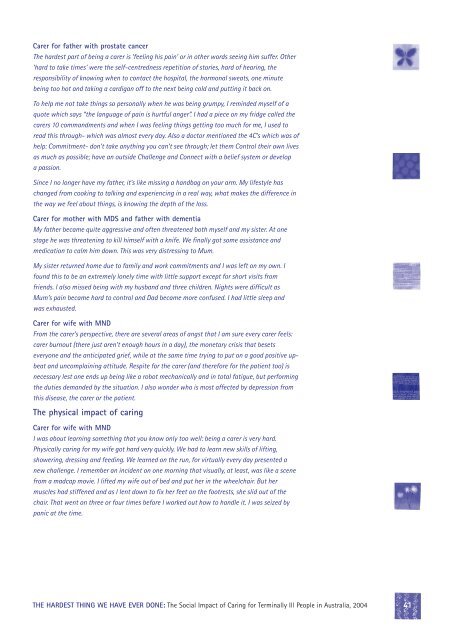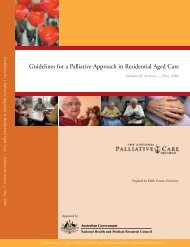The hardest thing we have ever done - Palliative Care Australia
The hardest thing we have ever done - Palliative Care Australia
The hardest thing we have ever done - Palliative Care Australia
Create successful ePaper yourself
Turn your PDF publications into a flip-book with our unique Google optimized e-Paper software.
<strong>Care</strong>r for father with prostate cancer<br />
<strong>The</strong> <strong>hardest</strong> part of being a carer is ‘feeling his pain’ or in other words seeing him suffer. Other<br />
‘hard to take times’ <strong>we</strong>re the self-centredness repetition of stories, hard of hearing, the<br />
responsibility of knowing when to contact the hospital, the hormonal s<strong>we</strong>ats, one minute<br />
being too hot and taking a cardigan off to the next being cold and putting it back on.<br />
To help me not take <strong>thing</strong>s so personally when he was being grumpy, I reminded myself of a<br />
quote which says “the language of pain is hurtful anger”. I had a piece on my fridge called the<br />
carers 10 commandments and when I was feeling <strong>thing</strong>s getting too much for me, I used to<br />
read this through- which was almost <strong>ever</strong>y day. Also a doctor mentioned the 4C’s which was of<br />
help: Commitment- don’t take any<strong>thing</strong> you can’t see through; let them Control their own lives<br />
as much as possible; <strong>have</strong> an outside Challenge and Connect with a belief system or develop<br />
a passion.<br />
Since I no longer <strong>have</strong> my father, it’s like missing a handbag on your arm. My lifestyle has<br />
changed from cooking to talking and experiencing in a real way, what makes the difference in<br />
the way <strong>we</strong> feel about <strong>thing</strong>s, is knowing the depth of the loss.<br />
<strong>Care</strong>r for mother with MDS and father with dementia<br />
My father became quite aggressive and often threatened both myself and my sister. At one<br />
stage he was threatening to kill himself with a knife. We finally got some assistance and<br />
medication to calm him down. This was very distressing to Mum.<br />
My sister returned home due to family and work commitments and I was left on my own. I<br />
found this to be an extremely lonely time with little support except for short visits from<br />
friends. I also missed being with my husband and three children. Nights <strong>we</strong>re difficult as<br />
Mum’s pain became hard to control and Dad became more confused. I had little sleep and<br />
was exhausted.<br />
<strong>Care</strong>r for wife with MND<br />
From the carer’s perspective, there are s<strong>ever</strong>al areas of angst that I am sure <strong>ever</strong>y carer feels:<br />
carer burnout (there just aren’t enough hours in a day), the monetary crisis that besets<br />
<strong>ever</strong>yone and the anticipated grief, while at the same time trying to put on a good positive upbeat<br />
and uncomplaining attitude. Respite for the carer (and therefore for the patient too) is<br />
necessary lest one ends up being like a robot mechanically and in total fatigue, but performing<br />
the duties demanded by the situation. I also wonder who is most affected by depression from<br />
this disease, the carer or the patient.<br />
<strong>The</strong> physical impact of caring<br />
<strong>Care</strong>r for wife with MND<br />
I was about learning some<strong>thing</strong> that you know only too <strong>we</strong>ll: being a carer is very hard.<br />
Physically caring for my wife got hard very quickly. We had to learn new skills of lifting,<br />
sho<strong>we</strong>ring, dressing and feeding. We learned on the run, for virtually <strong>ever</strong>y day presented a<br />
new challenge. I remember an incident on one morning that visually, at least, was like a scene<br />
from a madcap movie. I lifted my wife out of bed and put her in the wheelchair. But her<br />
muscles had stiffened and as I lent down to fix her feet on the footrests, she slid out of the<br />
chair. That <strong>we</strong>nt on three or four times before I worked out how to handle it. I was seized by<br />
panic at the time.<br />
THE HARDEST THING WE HAVE EVER DONE: <strong>The</strong> Social Impact of Caring for Terminally Ill People in <strong>Australia</strong>, 2004<br />
41
















